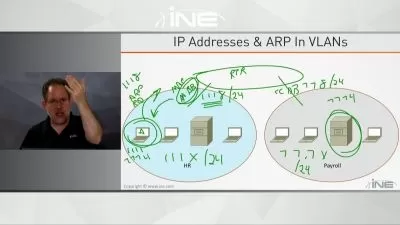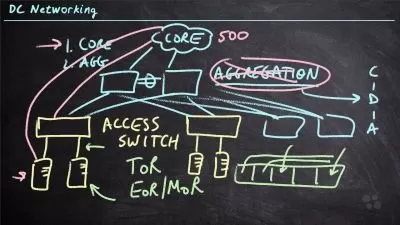Cisco CCNP Routing
EasyShiksha Learning
5:21:54
Description
Cisco CCNP Routing Certification Course
What You'll Learn?
- CCNP certification with a framework
- Basic & Advanced Routing Concepts
- Routing Protocols
- Routing Functions
Who is this for?
More details
DescriptionCisco Certified Network Professional (CCNP) Routing and Switching certification validates that you have the ability to plan, implement, verify and troubleshoot local and wide area enterprise networks and that you can work collaboratively with specialists on advanced security, voice, wireless and video solutions.
This course is intended to provide those pursuing the CCNP certification with a framework of what concepts need to be studied. This is not a comprehensive course containing all the secrets of the CCNP Routing exam, nor is it a “braindump†of questions and answers.
In this course we will cover these topics:
Part I – Addressing
Addressing is used to uniquely identify a host within a local network.
Section 1 IPv4 Addressing
Section 2 IPv6 Addressing
Section 3 TCP & UDP
Part II – Basic Routing Concepts
Routing is the process of sending a packet of information from one network to another network.
Section 4 The Routing Table
Section 5 Classful vs. Classless Routing
Section 6 Static vs. Dynamic Routing
Section 7 Configuring Static Routes
Section 8 Default Routing
Part III – Dynamic Routing Protocols
RIP is a standardized Distance Vector protocol, designed for use on smaller networks.
Section 9 RIP v1 & v2
Section 10 IGRP
Section 11 EIGRP
Section 12 OSPF
Section 13 IS-IS
Section 14 BGP
Part IV– Advanced Routing Functions
It is preferable to employ a single routing protocol in an internetwork environment, for simplicity and ease of management.
Section 15 Route Redistribution
Section 16 Access Control Lists
Section 17 Route Filtering and Route-Maps
Section 18 Multicast
Who this course is for:
- Those who pursuing the CCNP certification
Cisco Certified Network Professional (CCNP) Routing and Switching certification validates that you have the ability to plan, implement, verify and troubleshoot local and wide area enterprise networks and that you can work collaboratively with specialists on advanced security, voice, wireless and video solutions.
This course is intended to provide those pursuing the CCNP certification with a framework of what concepts need to be studied. This is not a comprehensive course containing all the secrets of the CCNP Routing exam, nor is it a “braindump†of questions and answers.
In this course we will cover these topics:
Part I – Addressing
Addressing is used to uniquely identify a host within a local network.
Section 1 IPv4 Addressing
Section 2 IPv6 Addressing
Section 3 TCP & UDP
Part II – Basic Routing Concepts
Routing is the process of sending a packet of information from one network to another network.
Section 4 The Routing Table
Section 5 Classful vs. Classless Routing
Section 6 Static vs. Dynamic Routing
Section 7 Configuring Static Routes
Section 8 Default Routing
Part III – Dynamic Routing Protocols
RIP is a standardized Distance Vector protocol, designed for use on smaller networks.
Section 9 RIP v1 & v2
Section 10 IGRP
Section 11 EIGRP
Section 12 OSPF
Section 13 IS-IS
Section 14 BGP
Part IV– Advanced Routing Functions
It is preferable to employ a single routing protocol in an internetwork environment, for simplicity and ease of management.
Section 15 Route Redistribution
Section 16 Access Control Lists
Section 17 Route Filtering and Route-Maps
Section 18 Multicast
Who this course is for:
- Those who pursuing the CCNP certification
User Reviews
Rating
EasyShiksha Learning
Instructor's Courses
Udemy
View courses Udemy- language english
- Training sessions 59
- duration 5:21:54
- Release Date 2023/01/22










